The highs and lows of Malawi
“The fine for your violation will be 25,000”, said the smirking policeman as his head filled my driver’s side window. This is not how we expected our time in Malawi to begin but since he was holding my driver’s licence and truck papers I knew we had a bit of a problem. It appears our crime was to unknowingly drive in Malawi without local insurance but the penalty was completely this guy’s invention for his own personal benefit. Ah, welcome to Malawi!
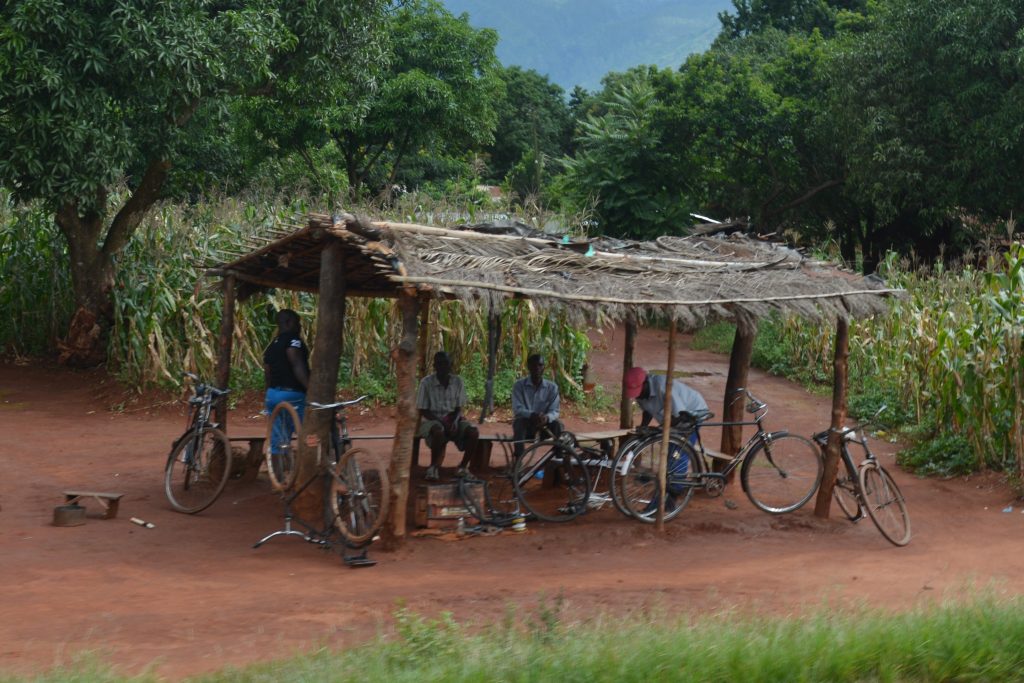
We immediately noticed that there are a lot more bicycles in Malawi than there were in Mozambique. And of course if you have bicycles you need bicycle repair shops like this one.
(Note that we passed through both Mozambique and Malawi just days before Cyclone Idai swept through these two impoverished countries. While we feel very lucky to have missed such a devastating storm we are shattered about how this storm affected so many defenseless people.)
Malawi is a sliver of a country wedged in between Mozambique and Zambia and in particular features the large and rich Lake Malawi. It is a former British colony and our arrival meant we could return to our more familiar English rather than battle with Portuguese in Mozambique. After paying for our expensive Malawi visas at the border and being stamped in we only made it to the second police checkpoint (there are many!) before the question of insurance was raised. But after an hour on the side of the road and some difficult negotiating with this corrupt policeman we had finally agreed on a compromise outcome. I paid a fine in two different currencies and we were on our way. As we left the checkpoint the policeman said to me, “You are a very strong and stubborn man” and I said, “So are you!”. My first friend in Malawi.
Life on the road is full of unexpected surprises. It took us two days longer to get out of Mozambique than we expected due to the terrible roads and us making a few wrong turns, now we were cruising on beautiful roads through the rich tea plantations (who knew Malawi produced all this tea?) and fields of corn with dramatic mountains rising up in the background.
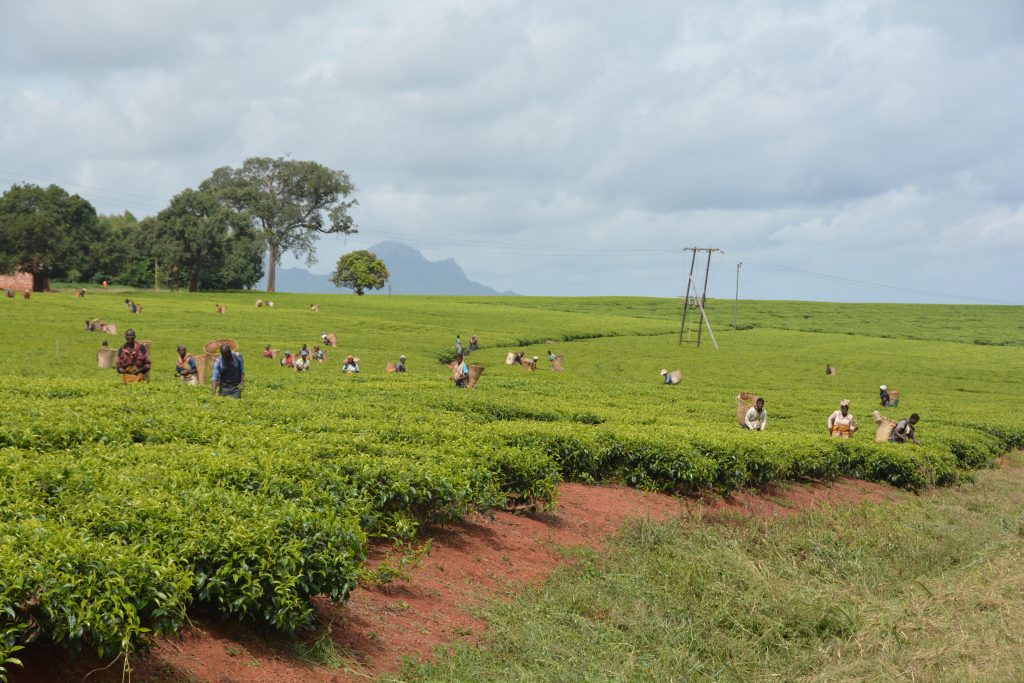
This section of southern Malawi featured beautiful rolling hills covered in tea plants – and it was harvest time!
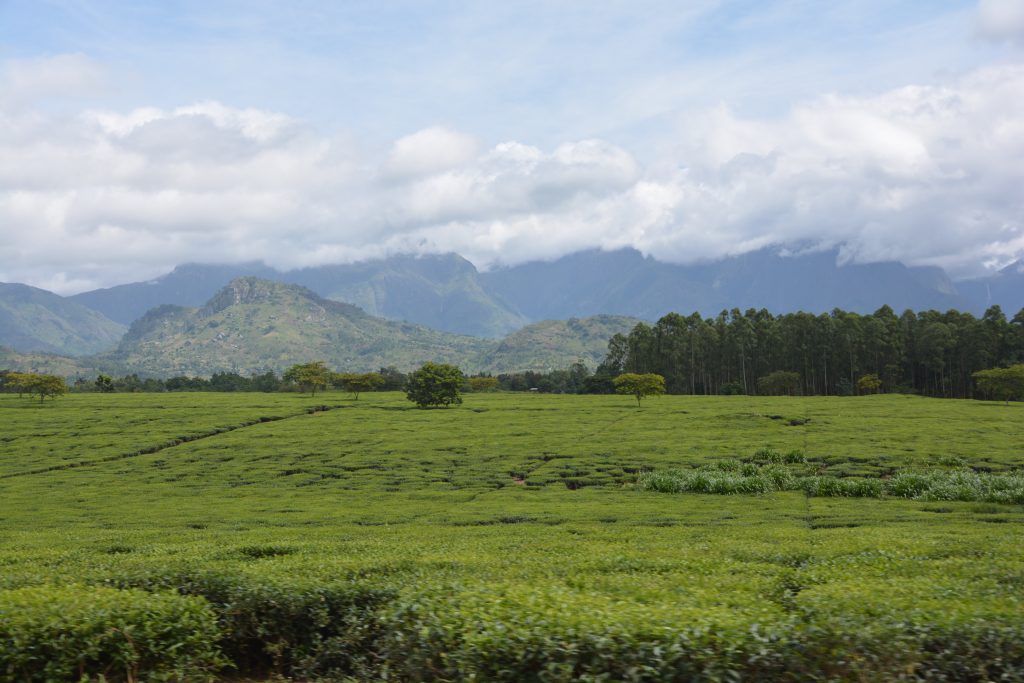
Not just tea – and there was lots of it – but as a background there was a spectacular mountain range rising into the clouds
After we bought insurance and two little reflective roadside triangles (that I was also allegedly in violation of for not having) we headed into Blantyre, the main town of southern Malawi, for supplies, fuel and to fix this slow leak tire. We ended up camping that night in the grounds of a restaurant up on the nearby Zomba Plateau amongst a beautiful garden, some rare and unreliable wifi and cooler weather at over 1,000 metres.
But this being Africa, nothing is as it seems. The next day our tire was flat again and we limped into a small roadside garage to have it fixed for the second time. The whole thing became quite an ordeal with the tire actually having to go to another garage to be patched before being returned to its rightful place. The whole experience was very African – smilingly friendly, ever-helpful, painfully slow, subtly vague and dirt cheap. After a full morning of tire fix adventure we were set back $12 and were on our way again.

But the next day we the tire was flat again and we stopped at this roadside garage to get it fixed – all very public and quite a spectacle for the locals
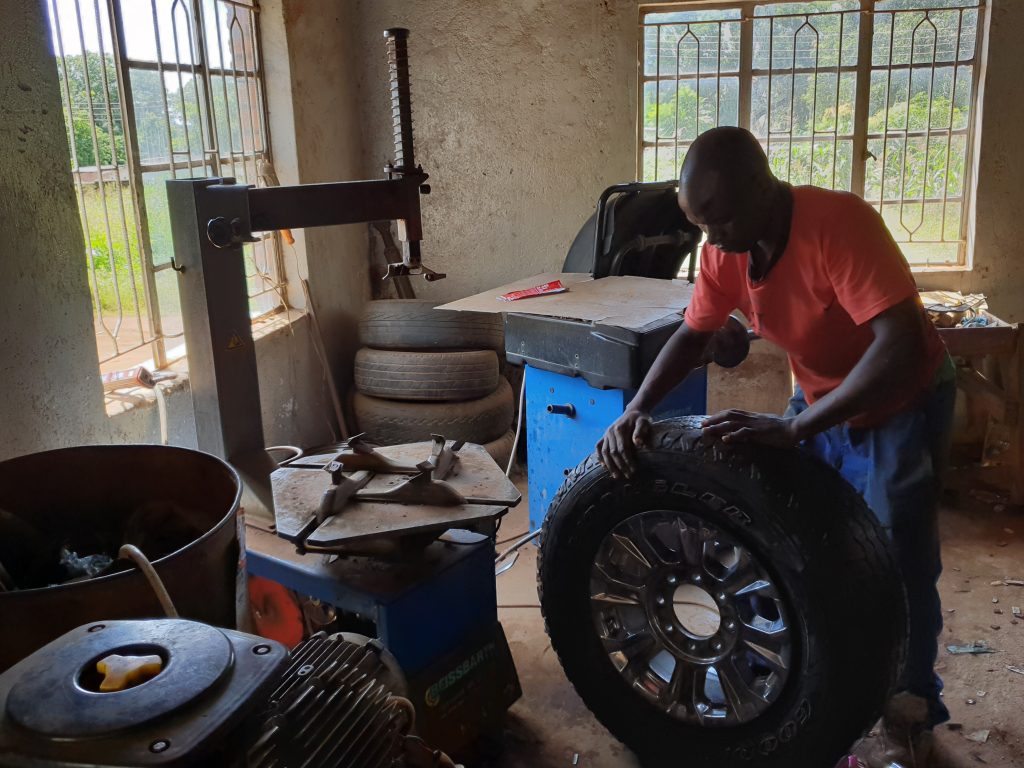
Once we got the tire off we threw it into the back of a car and drove to a tire fix-it place. This guy then patched the plug and assured me it would not leak anymore (he lied).
We had plans to visit Liwonde National Park with its strong variety of wild life along the Shire River but a brief visit into the park told us the river cruises were infrequent and not timely for us so reluctantly we moved on.
We drove northward on good roads, dodging the people, animals and occasional car, stopping in busy villages to buy colourful sarongs, loving the huge baobab trees that dotted the landscape and seemed to each have a shape and personality of their own.
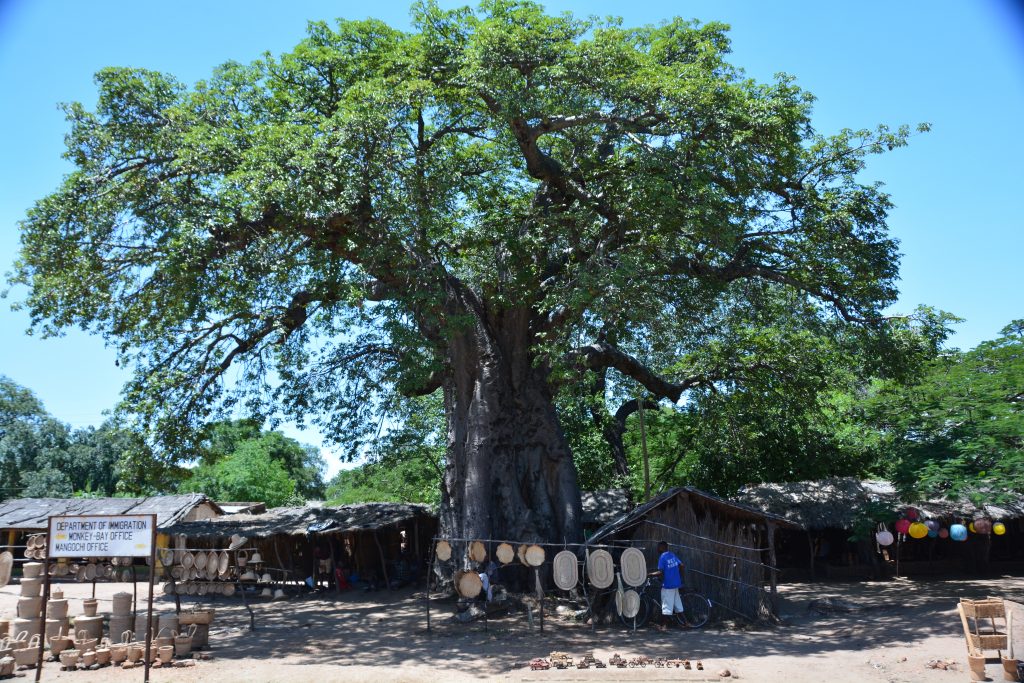
Baobab trees are great fun to see – each seems to have a shape and personality of its own and many are incorporated into the locals’ homes, living space or stalls
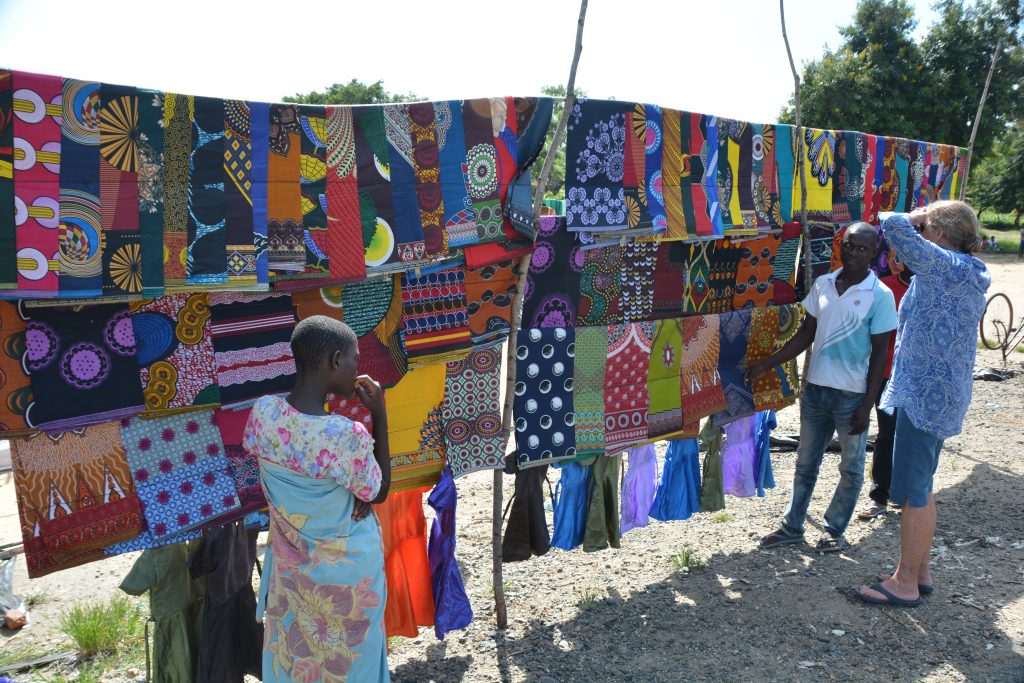
Julie loved stopping at all the stalls selling sarongs – so colourful and fun and a great way to interact with the stunned locals
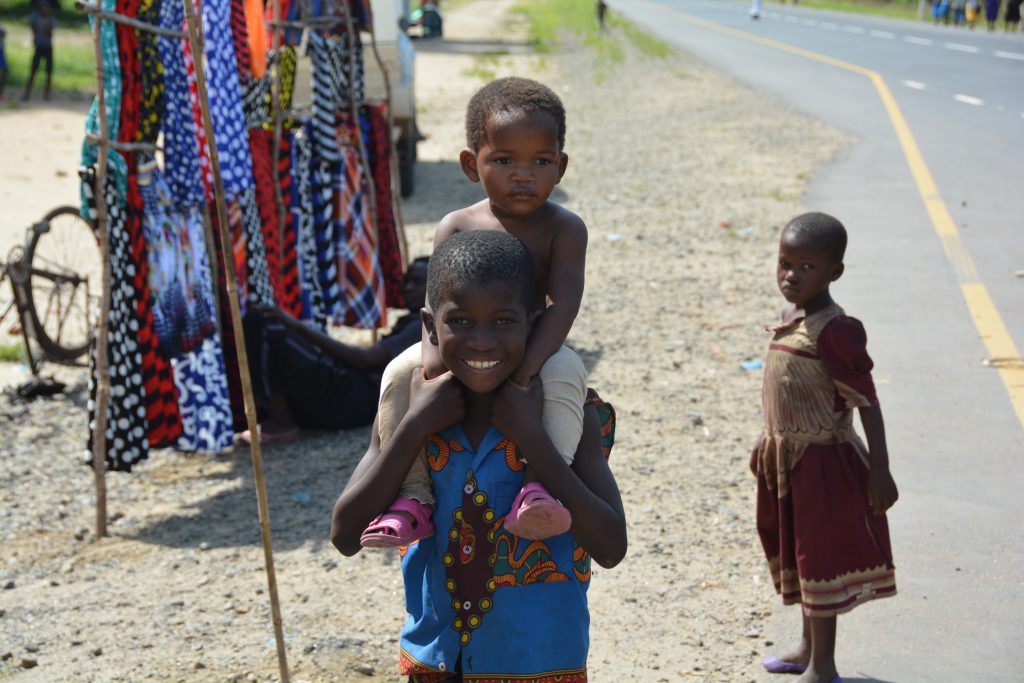
There is no escaping the inquisitive kids who are everywhere and like to come up to get a closer look at these two aliens
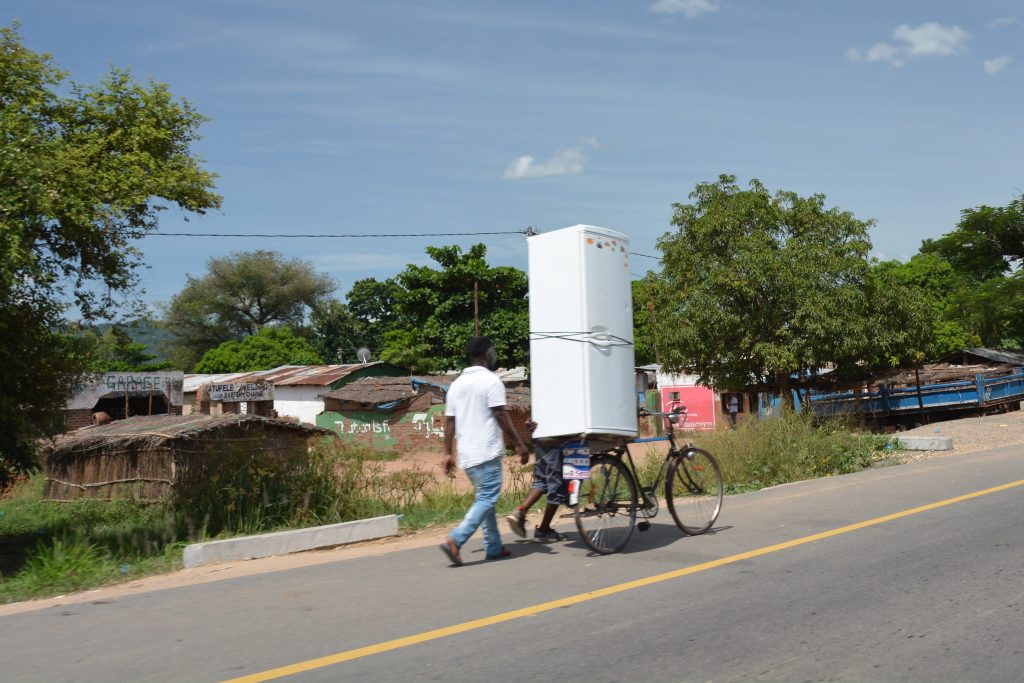
Did I mention that bicycles are Malawians’ best friend? How about using one to bring home a new fridge?
Eventually we made Lake Malawi, the signature piece of this small country, and travelled up its coastline to Lake Malawi National Park. We camped that night overlooking the beach at a place called Fat Monkeys, enjoying a stroll on the beach amongst the excited children and fishing boats carved from a single tree’s trunk, a stunning sunset and a super curry at the camp’s little restaurant on the beach. We were in heaven.
Everything slows down at Lake Malawi, one of the largest lakes in Africa with the largest selection of fish species of any lake in the world. After pancakes on the sand – and who wouldn’t?- we joined a young couple for a boat trip out to nearby Thumbi Island for a couple of totally enjoyable hours snorkelling along its rocky shores amongst a colourful range of cichlid fish.
Browns, blues, oranges, whites, stripes, dots, big and small, these beautiful fish swam all around us, partly encouraged by the bread our boatman Harry would throw out to them. So thick at times your hands touched fish as you swam and cheeky enough to nip at the dead skin on your heals, this was total immersion snorkelling. Julie and I had never snorkeled in fresh water and the water’s perfect temperature and lack of current made the whole experience super cool.
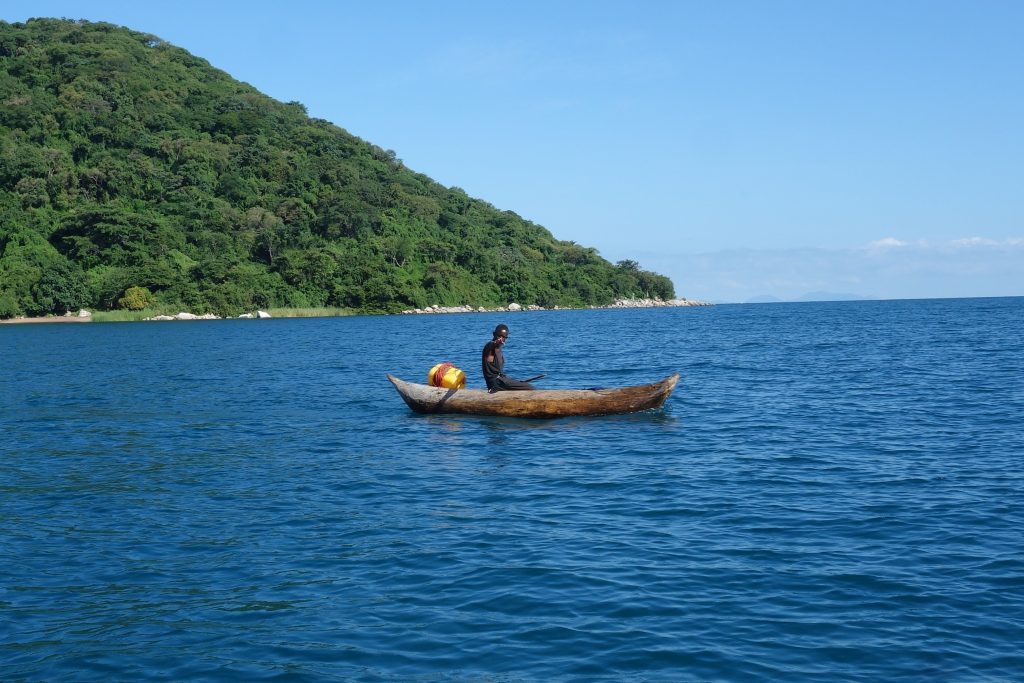
A local fisherman on the lake – his canoe is dugout from a single fallen tree and looks extremely precarious to paddle around
Not satisfied with our dose of Lake Malawi, we drove further north along the coast past countless beautiful baobab trees, sharing the good roads with a steady stream of bicyclists, motorbikes and walkers, aiming for more coastal time. As a point of difference and economic development, we saw almost no bicycles or motorbikes in Mozambique – everyone was walking, including the school children, sometimes for very long distances. But Malawi is different, their homes are almost all constructed of locally made brick, rather than Mozambique’s mud and stick homes, and the roadside markets clearly have a wider and better range of goods for sale. Malawi is a long way from easy street but they’re not last in line.
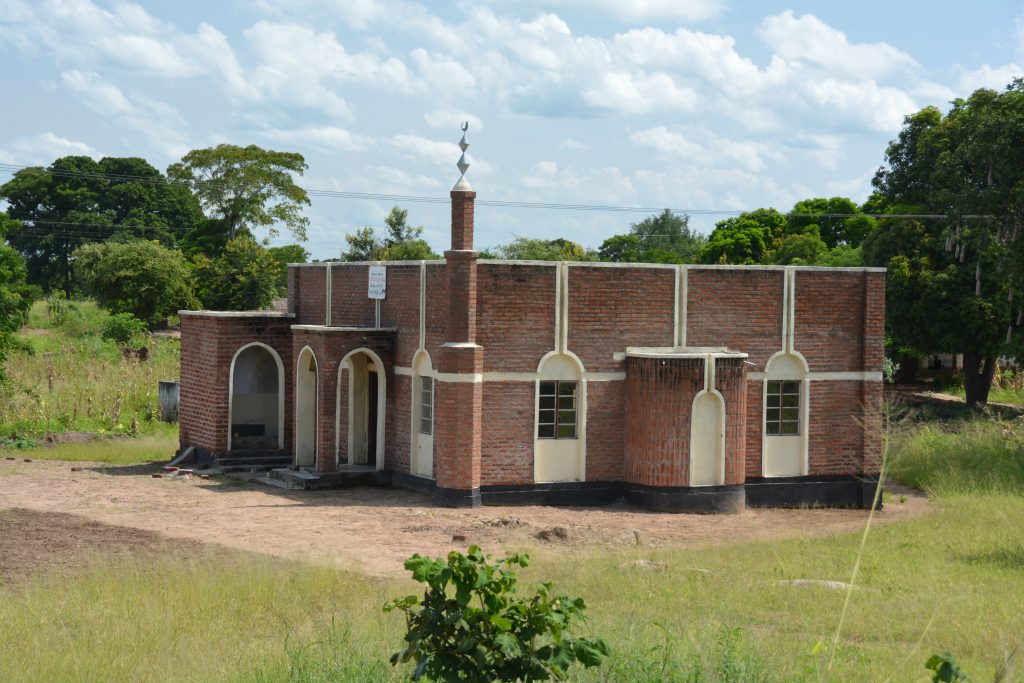
Malawi is a very religious country and 13% of the population are Muslim. We saw many modest mosques like this along the side of the road.
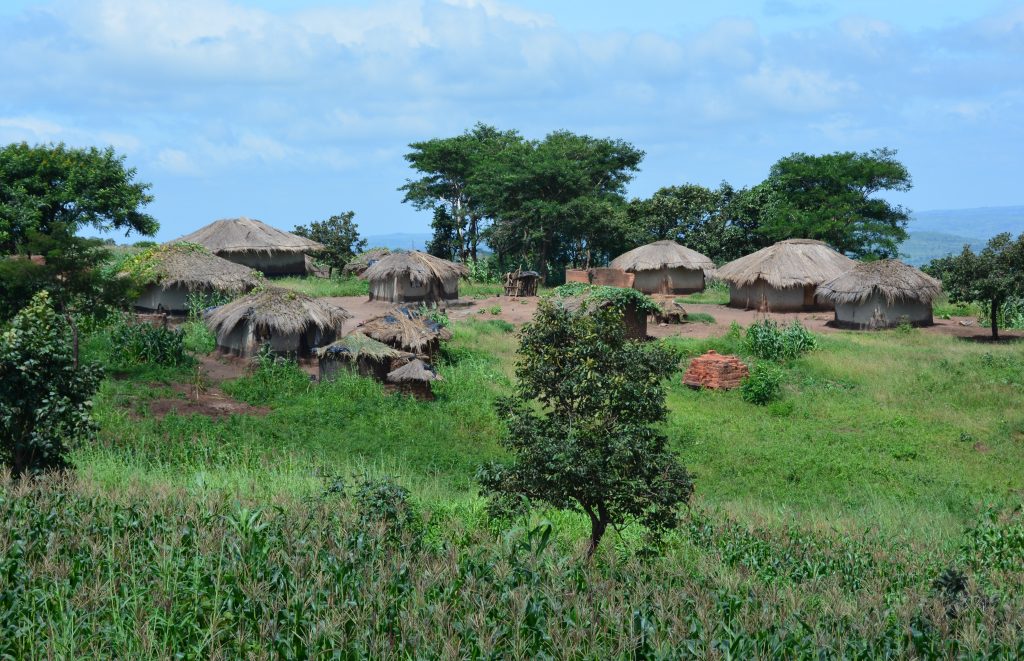
A classic scene in Malawi – the simple rectangle or rondavel round homes and thatched roofs with maize growing all around it
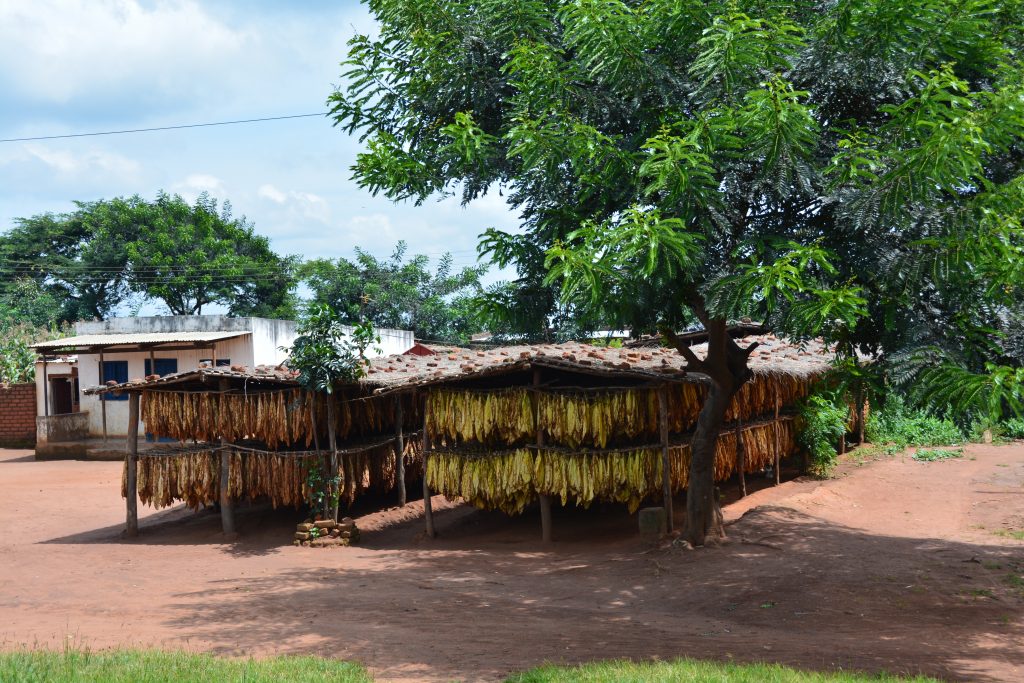
Malawi also produces substantial amounts of tobacco and we saw it drying in these open shelters on the side of the road
We pulled into Senga Bay and a cool little lodge and camping spot called Cool Runnings, right on the sandy beach, tucked away under enormous flame trees. Here we lolled away the late afternoon, enjoying the local spectacle on the beach, catching some cooling breezes, perhaps a couple of early beers. As we reclined on our comfy reclining chairs in the shade we compared these moments to our time living in Thailand with the endless afternoons on sandy beaches that we loved so much.
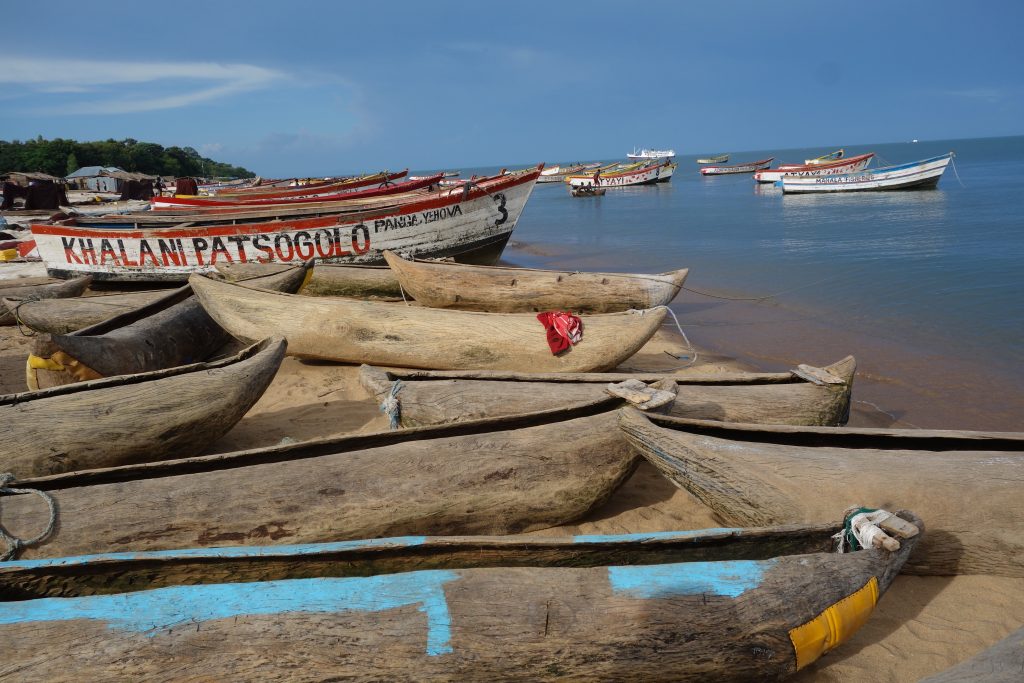
Lake Malawi is all about fishing with the fishermen owning these small dugout canoes and earning a living on catching just a handful of fish a day
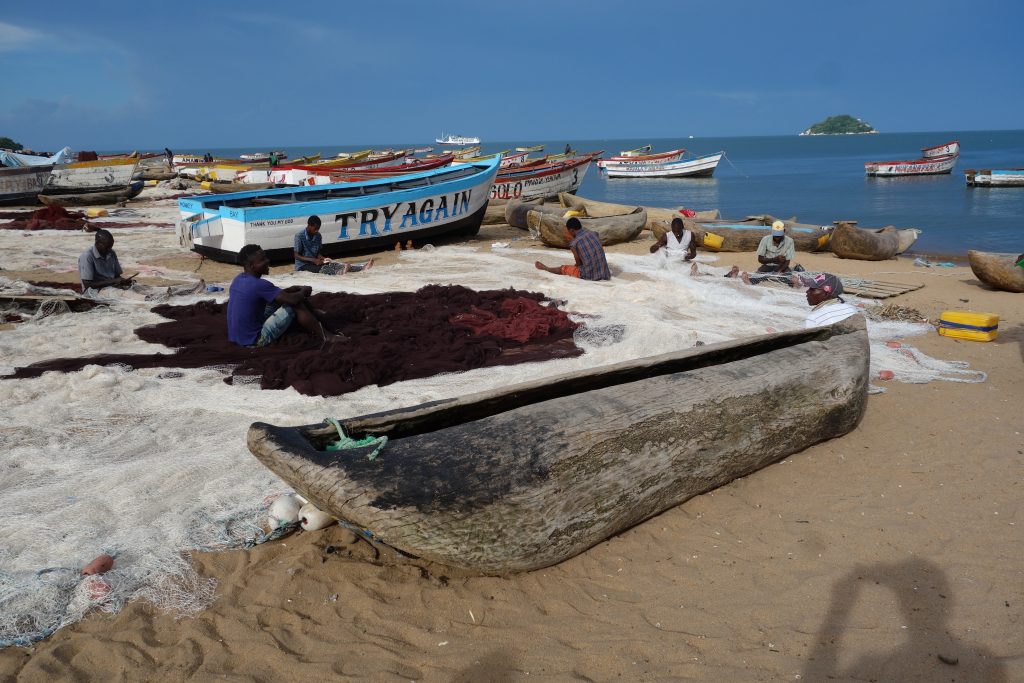
When the fishermen come in with their catch they then need to put in some time repairing their precious nets
But as we read more and engage with the locals about life in Malawi we see that the country still has many challenges. Malawi has one of the highest rates of HIV in the world, officially about 10% of the population are infected but in reality, the rate is probably much higher. It is also said that 90% of the population does not have reliable access to electricity in their homes, something that the western world just takes for granted.
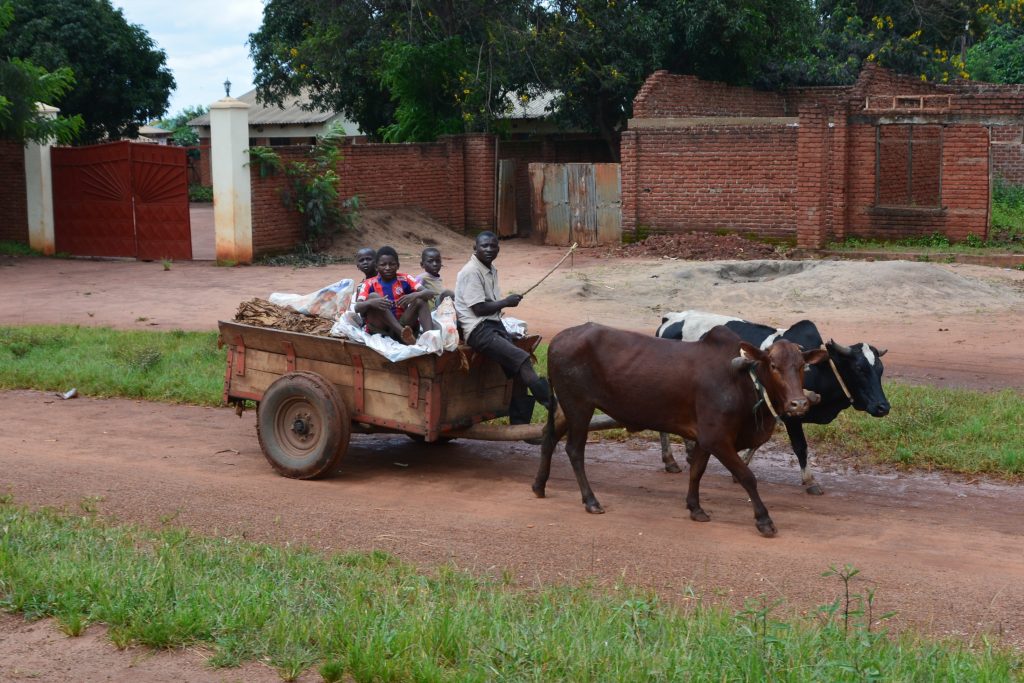
So many scenes remind us that this country is struggling with even the most basic services…but they seem to get on as best they can
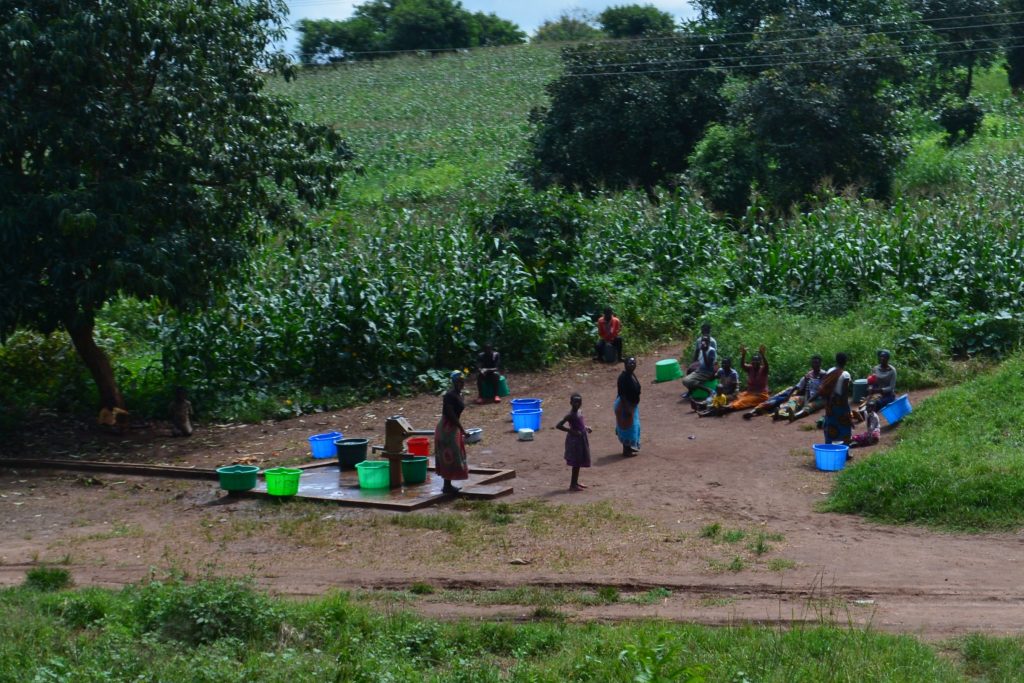
Most villages do not have electricity or running water but the local water well pump is always a colourful scene of people coming together to pump their water and have a chat
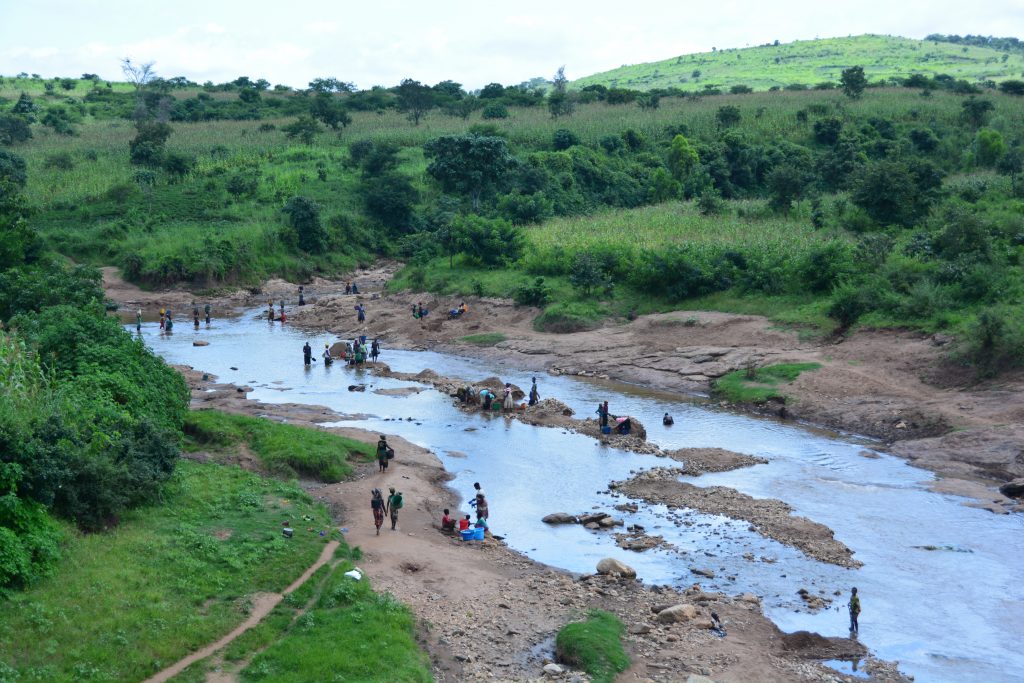
It’s washing day in the local stream which means children have a play and swim while mums do the washing
And this is crazy, the largest monetary note in Malawi is the handsome 2,000 Kwacha note which is worth about A$4.00. When I got 100,000 Kwacha out of the ATM, about $200 (almost the price of a tank of fuel), I received a pile of fifty 2,000 Kwacha notes. The smallest note is 20 Kwacha which is worth only 4 cents. And then there are the small crazy coins…

The local Malawian Kwacha comes in colourful notes of very small value and some coins which are worth a small fraction of a cent
We left Cool Runnings and headed for our next country, Zambia, but I could tell something was wrong with the brakes. I’d felt this before, it was almost definitely the brake pads. We couldn’t believe it, another issue in a steady stream of problems for our mighty beast, this one potentially much bigger. Luckily we had to pass Malawi’s capital, Lilongwe, and we found a garage that was open Saturday afternoon.
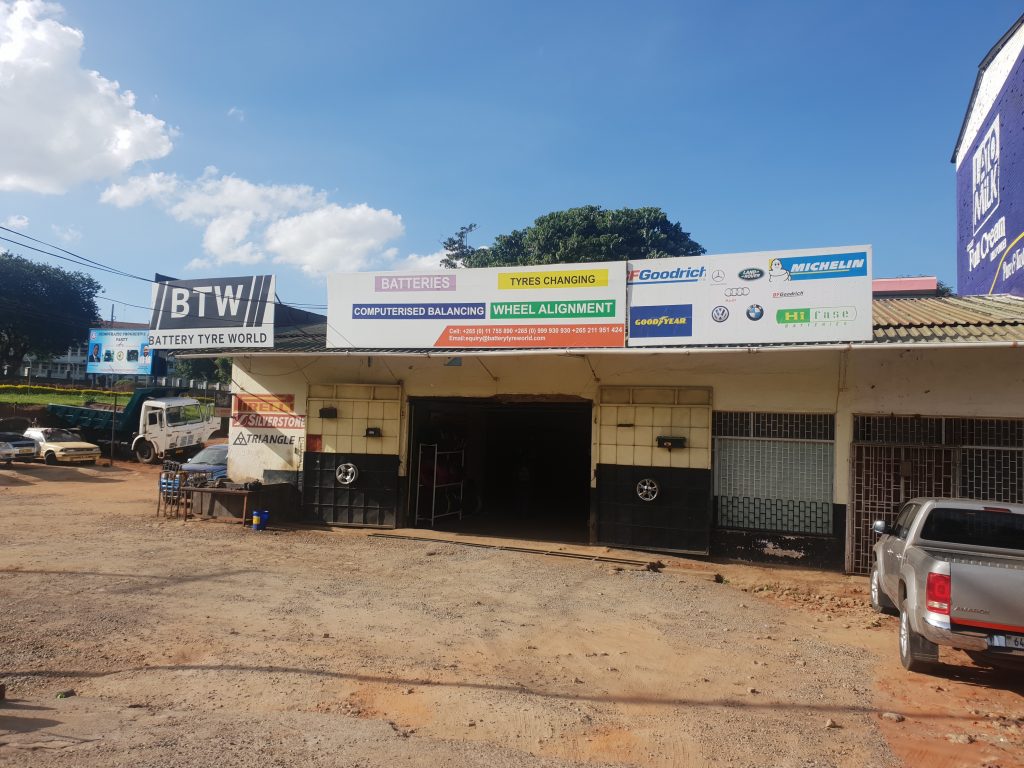
We spent most of the day at this garage – the source of much frustration and cost but eventually salvation
Without dwelling on the gruesome details, and they were gruesome, let’s just say that six hours after pulling into the garage, meeting some outstanding guys working there and being relieved of a few hundred thousand Kwachas, we pulled out with rebonded brake pads. In effect, they cut and glued new asbestos pads onto the old brake pad base. It was a very African solution given it’s impossible to get the same pads for a Ford F250 in Malawi. We were very grateful and deeply pissed off all at the same time.
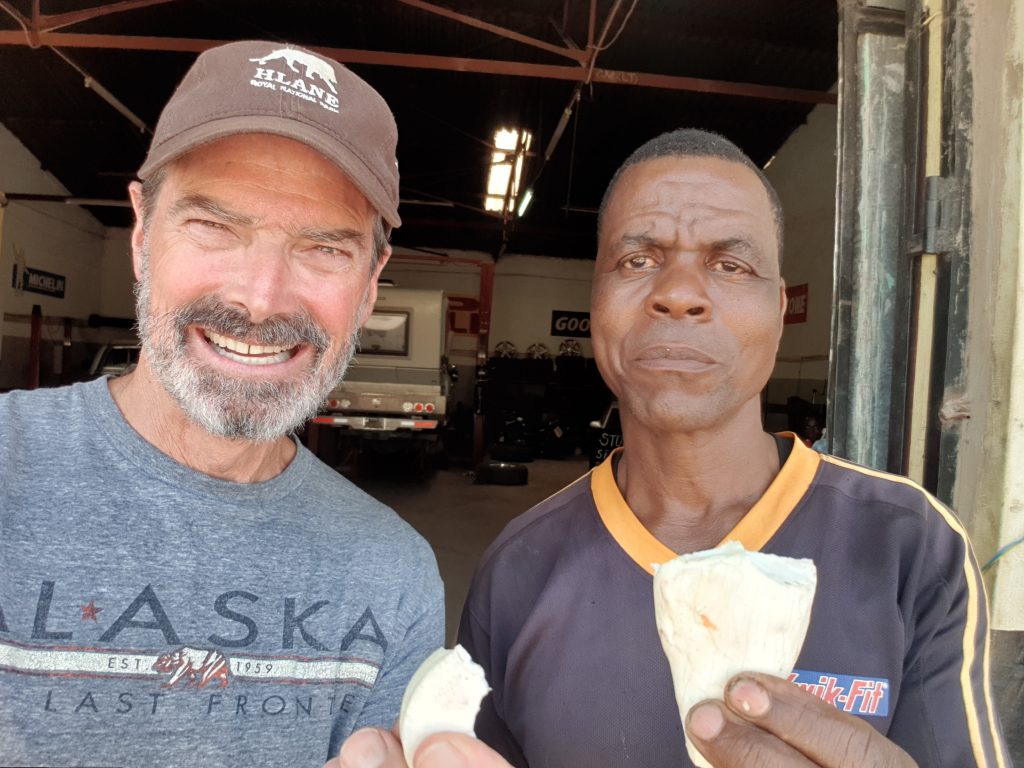
One of the staple foods of people in Malawi is cassava, you see it growing everywhere, and this mechanic offered to share his with me at lunch time
After camping in a woodland reserve near Lilongwe we pushed on towards the Zambian border, only to find more worrying noise from our front left wheel. It was a Sunday but we were reluctant to leave the capital and head back into the bush without resolving this new problem which almost certainly was related to our new hand-forged brake pads. Not a problem, another African solution, a motorbike guy asked if we needed help, he has a friend down the road who is a mechanic. And sure enough, Vincent was able to see that our new brake pads on that wheel were too big so he manually grinded them on the cement curb until they were worn down enough to fit properly inside the calliper. Problem solved. And on that relieved note we finally left Malawi.
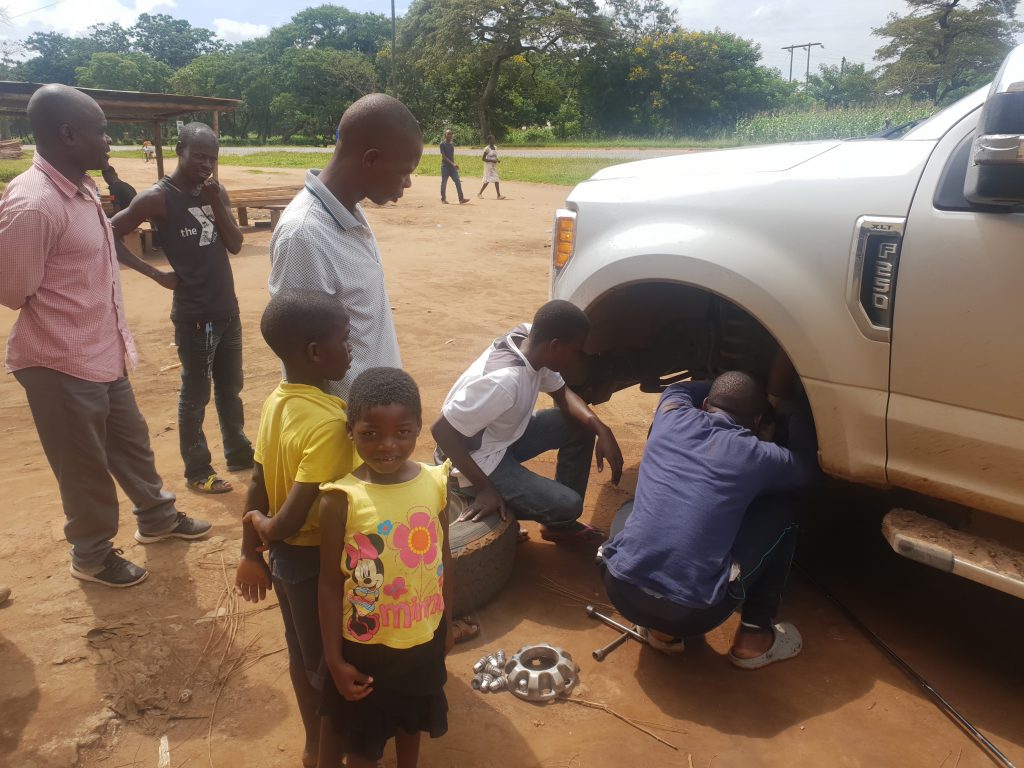
Oh no, one of our new freshly made brake pads was too big but we found another roadside mechanic who was able to fix it
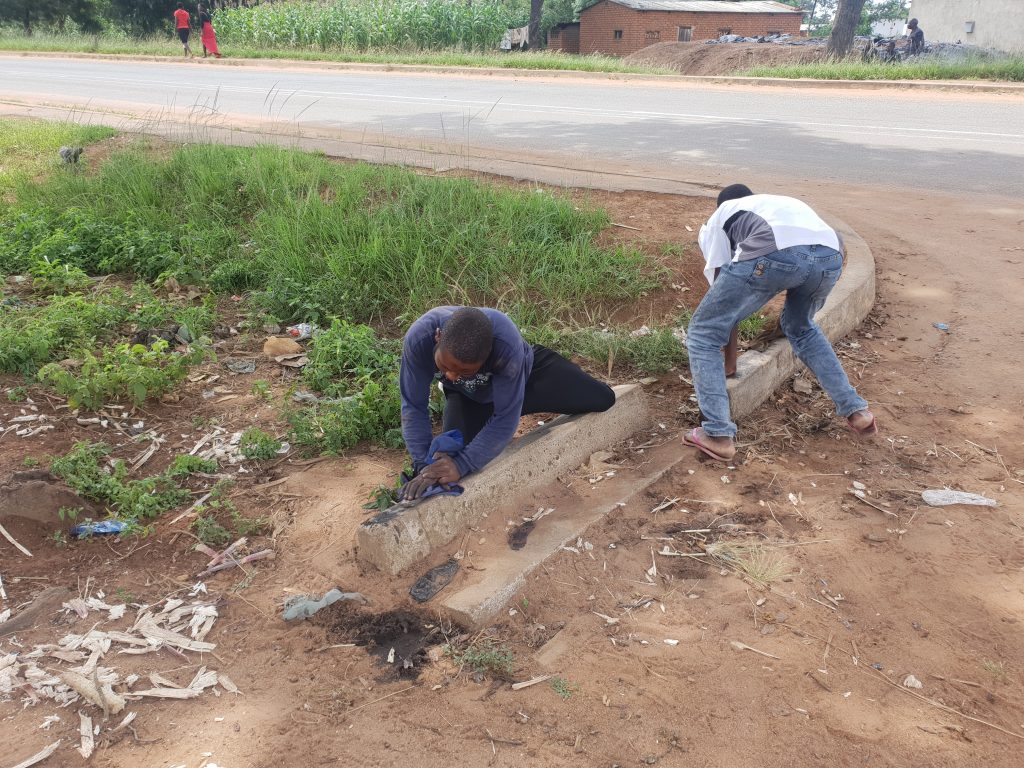
Our new best friend mechanic Vincent and his mate take our too-large brake pads and manually grind them on a nearby gutter until they fit properly in the pad housing – another great African solution
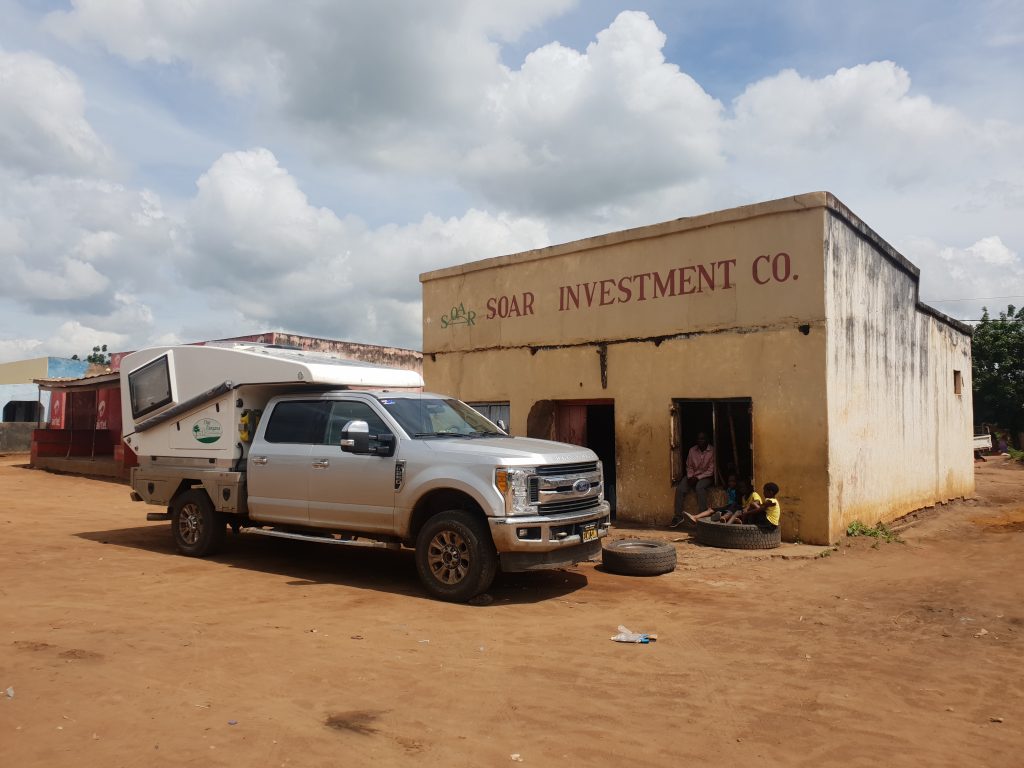
Here’s the place we pulled up to get our brake pad fixed – inside the building was tobacco drying on racks
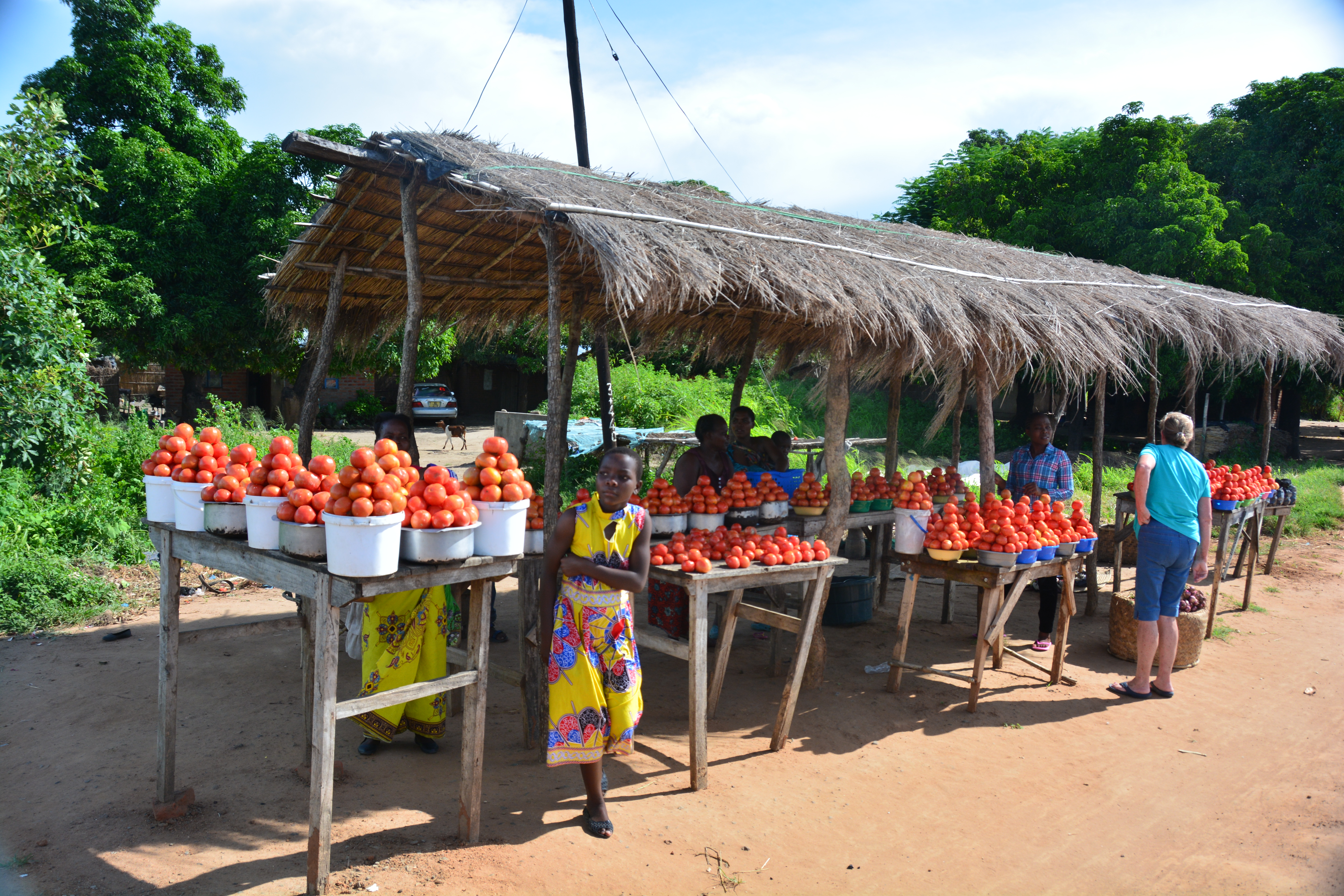
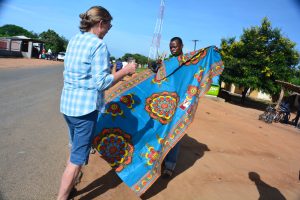
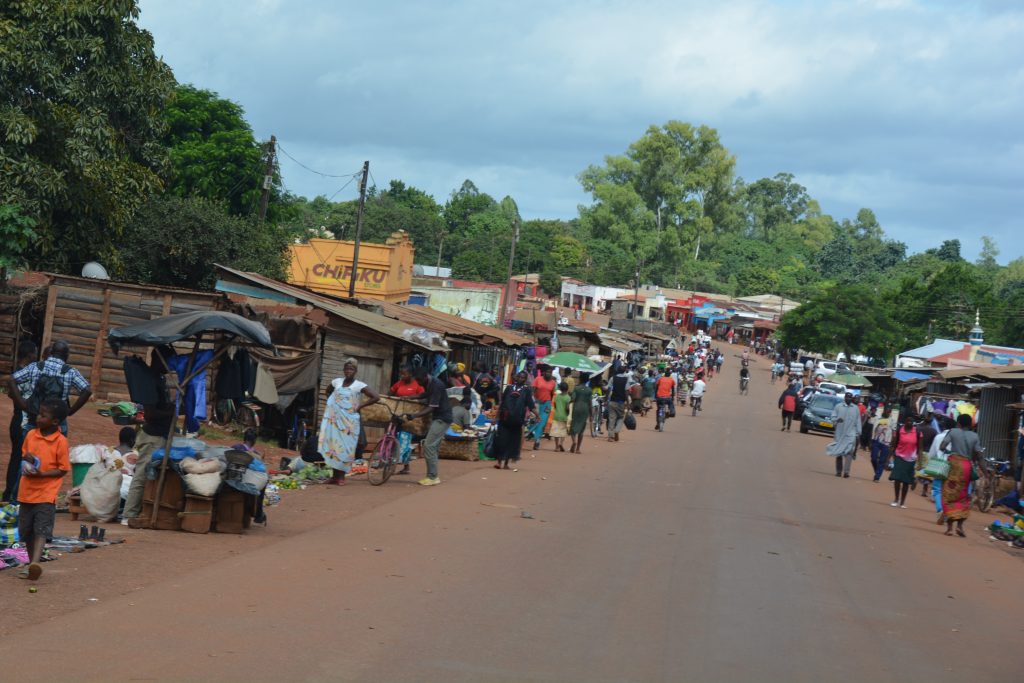
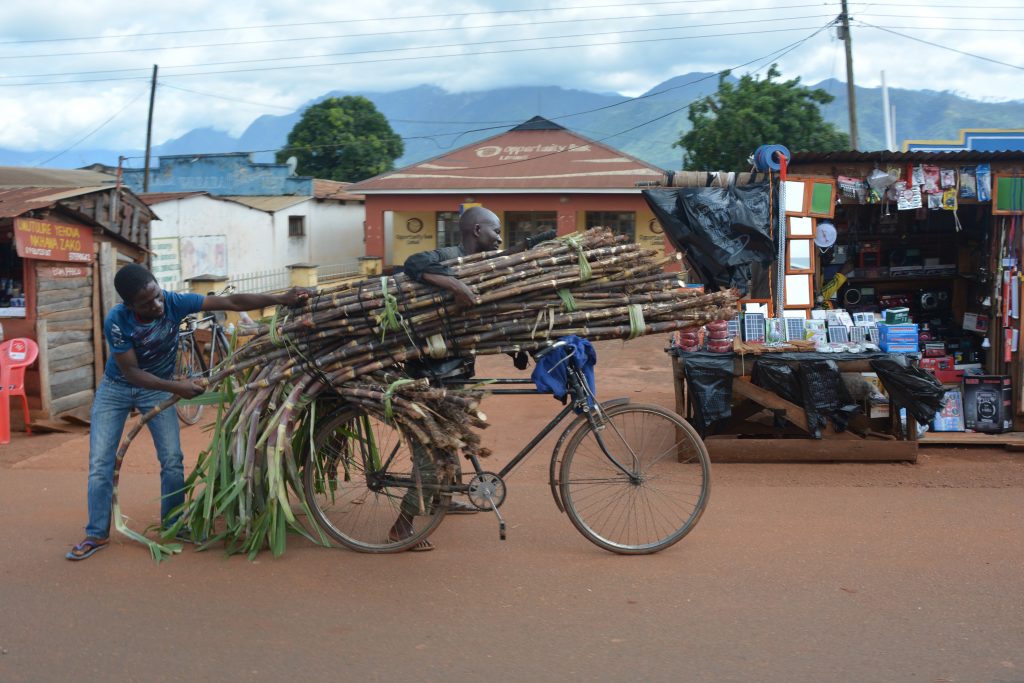
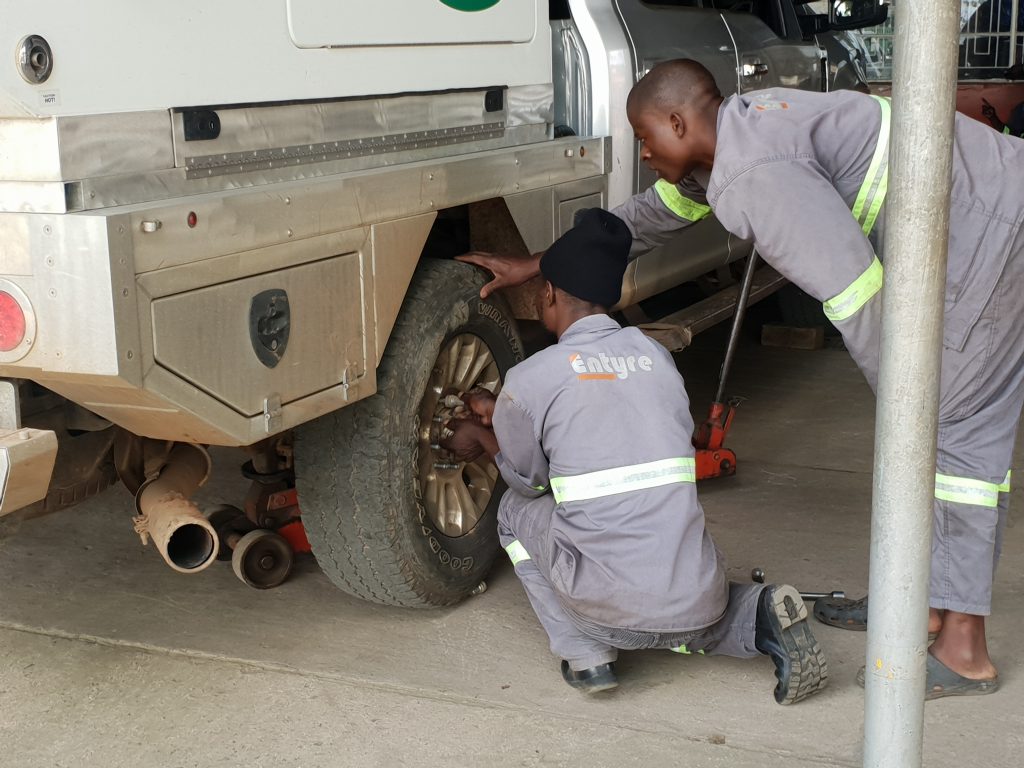
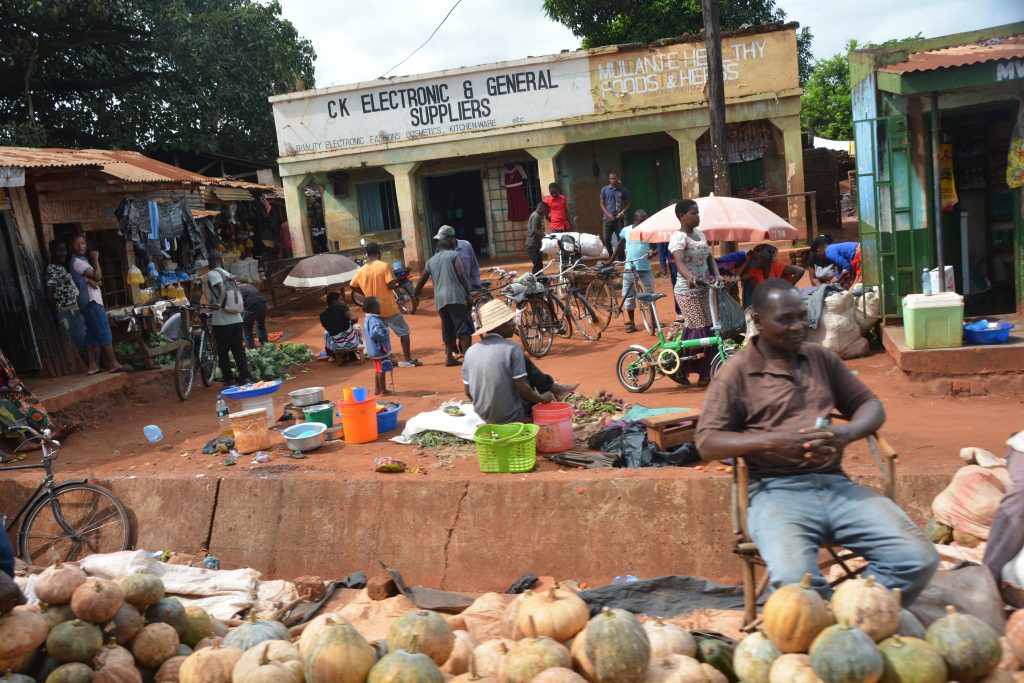
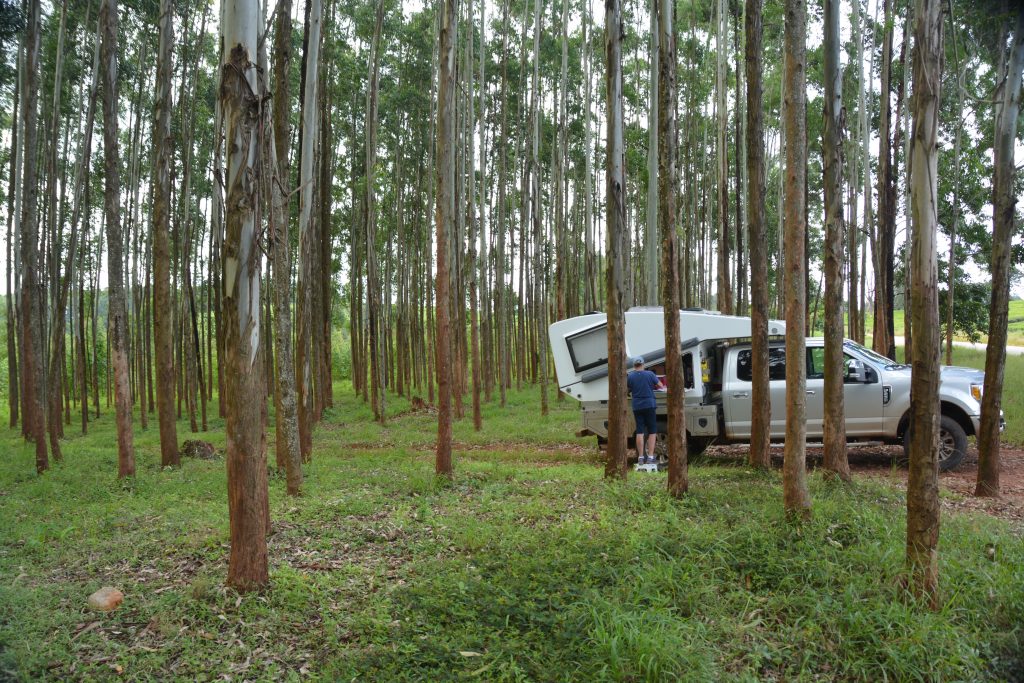
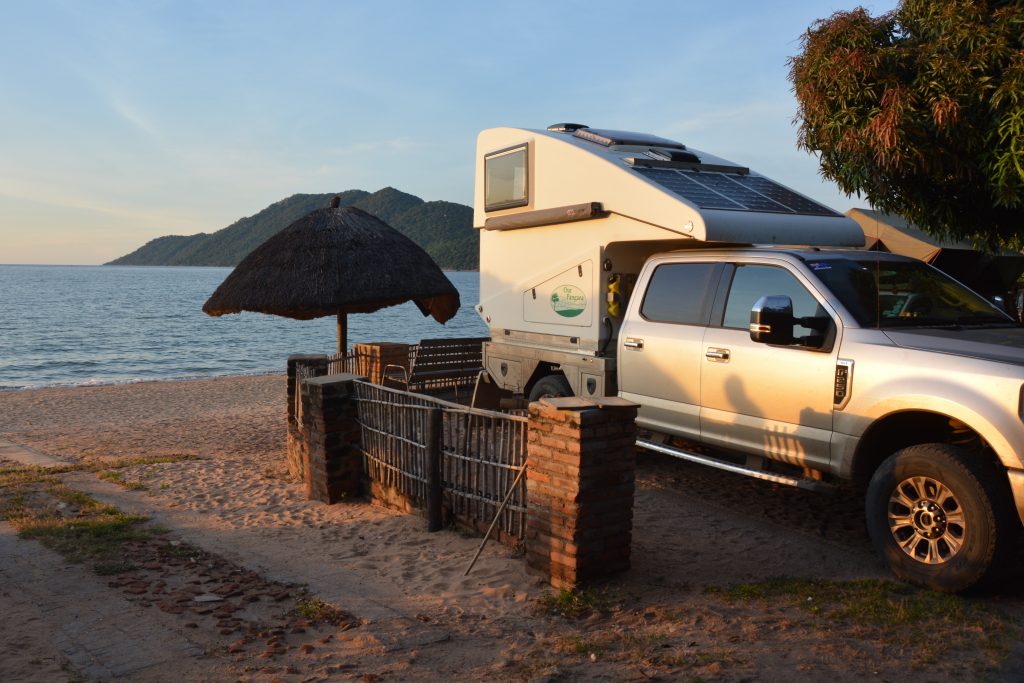
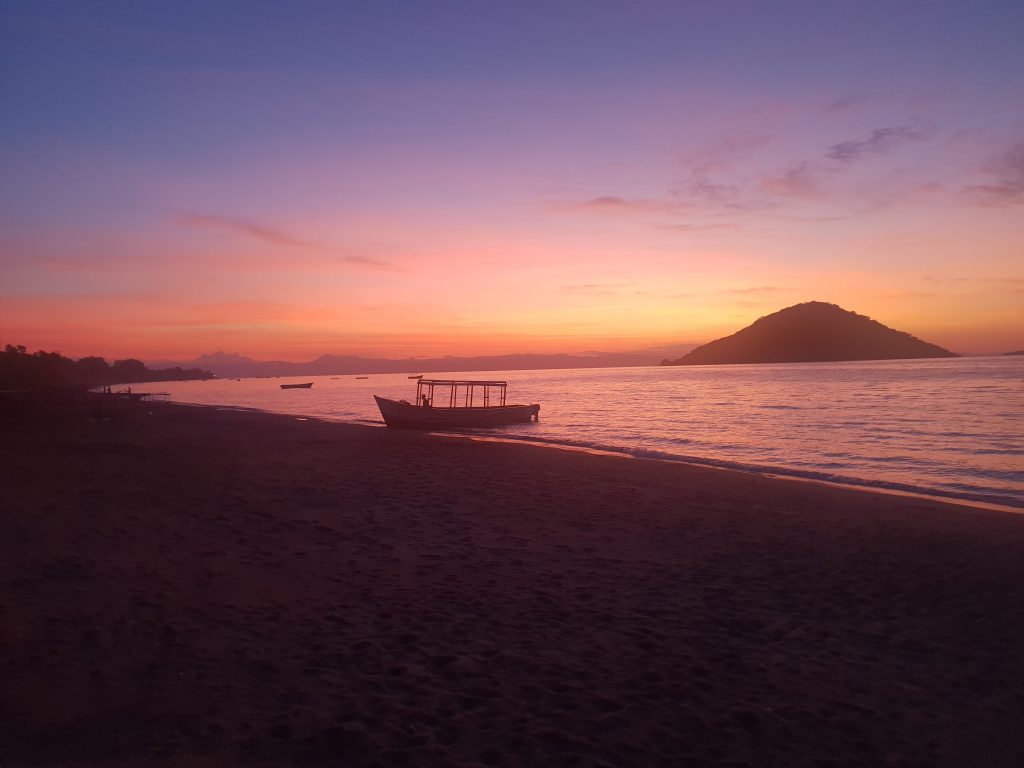
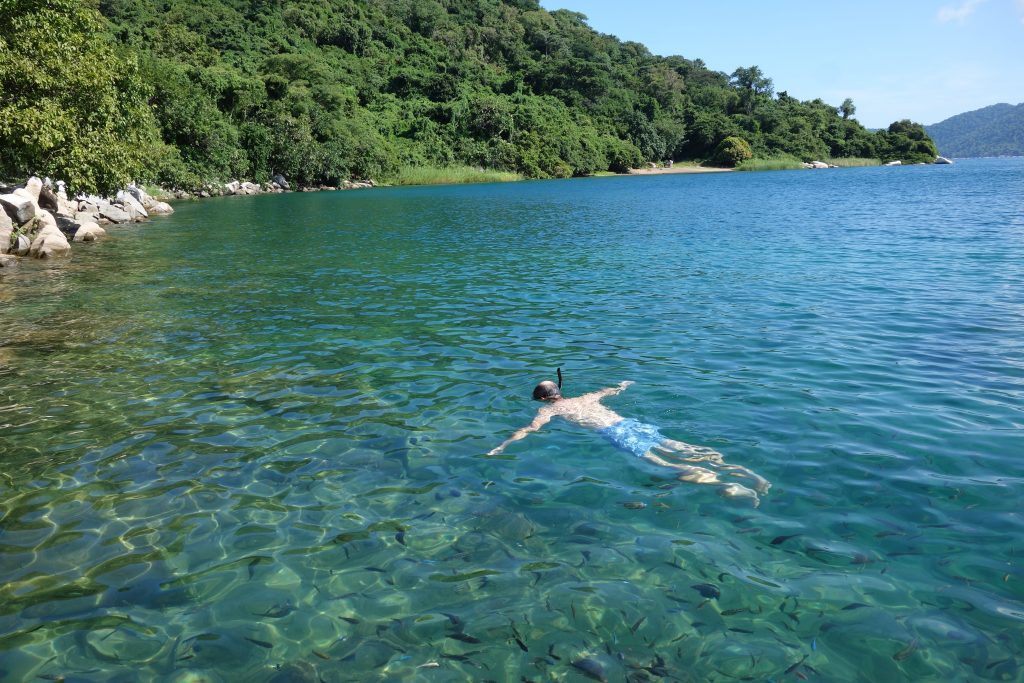
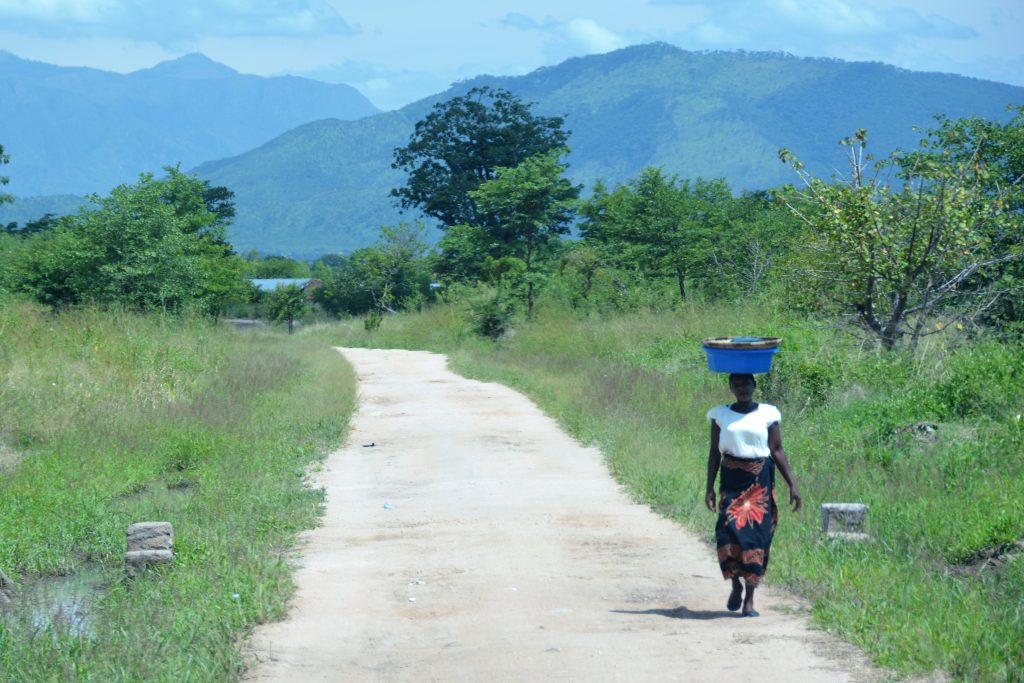
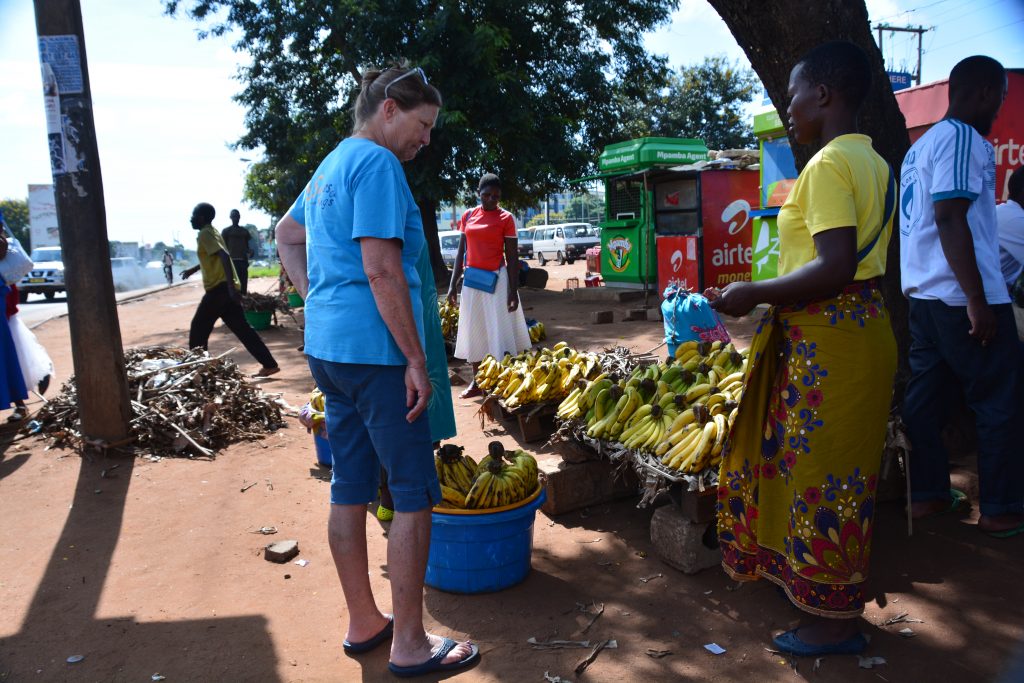
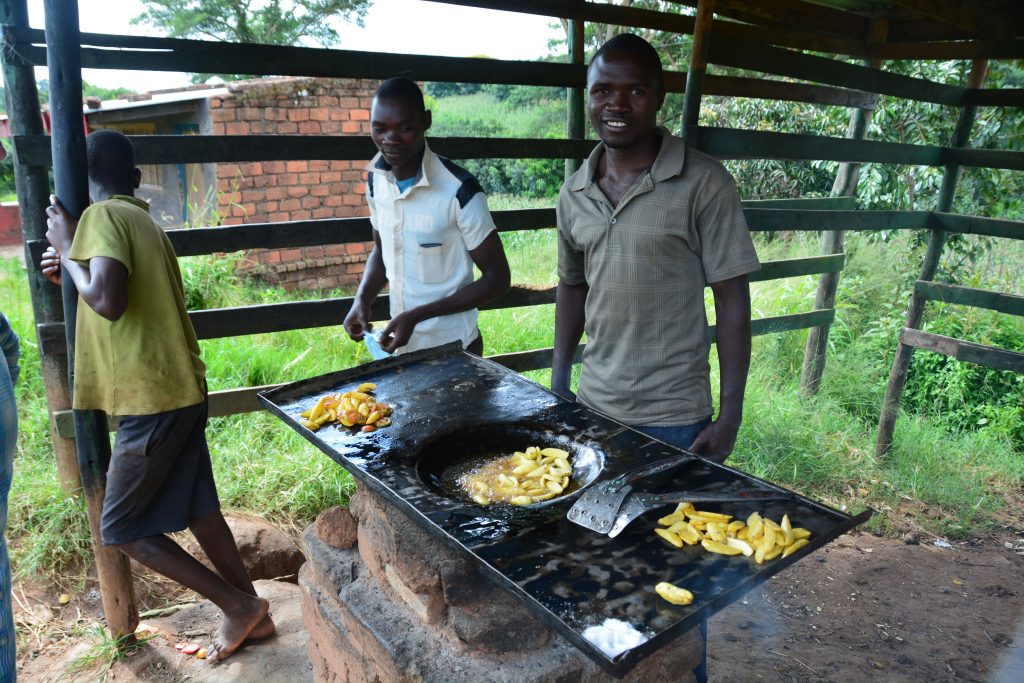
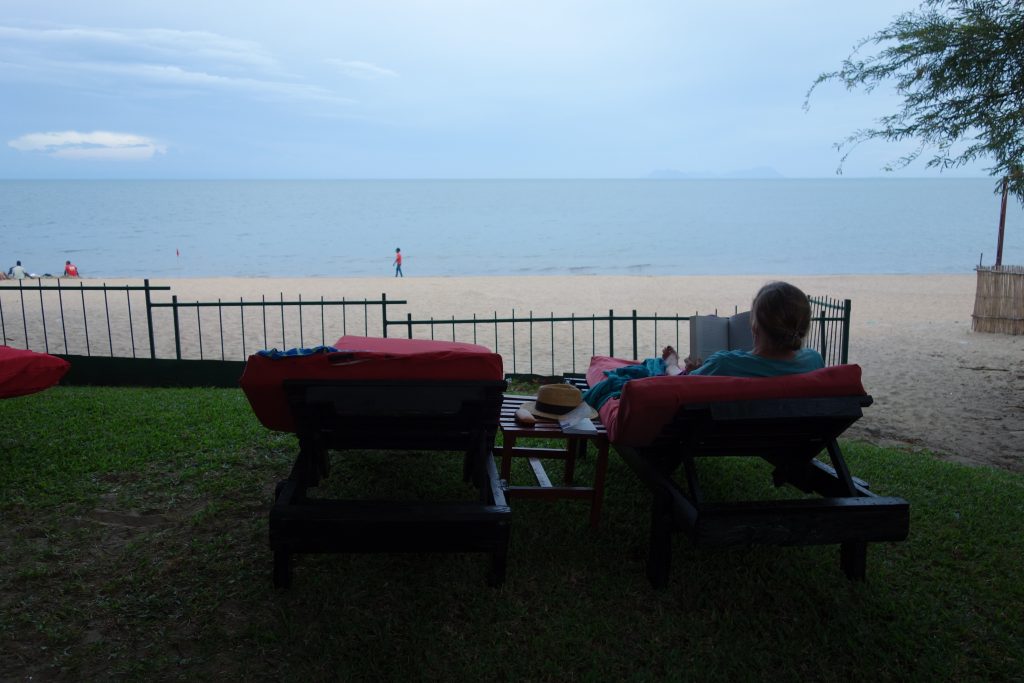
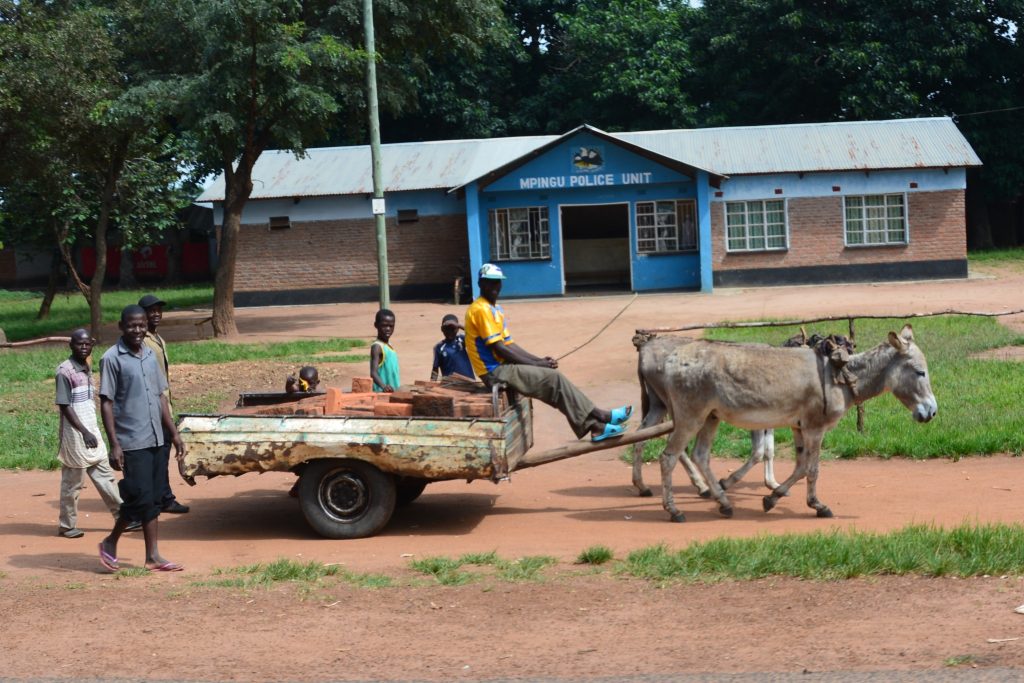
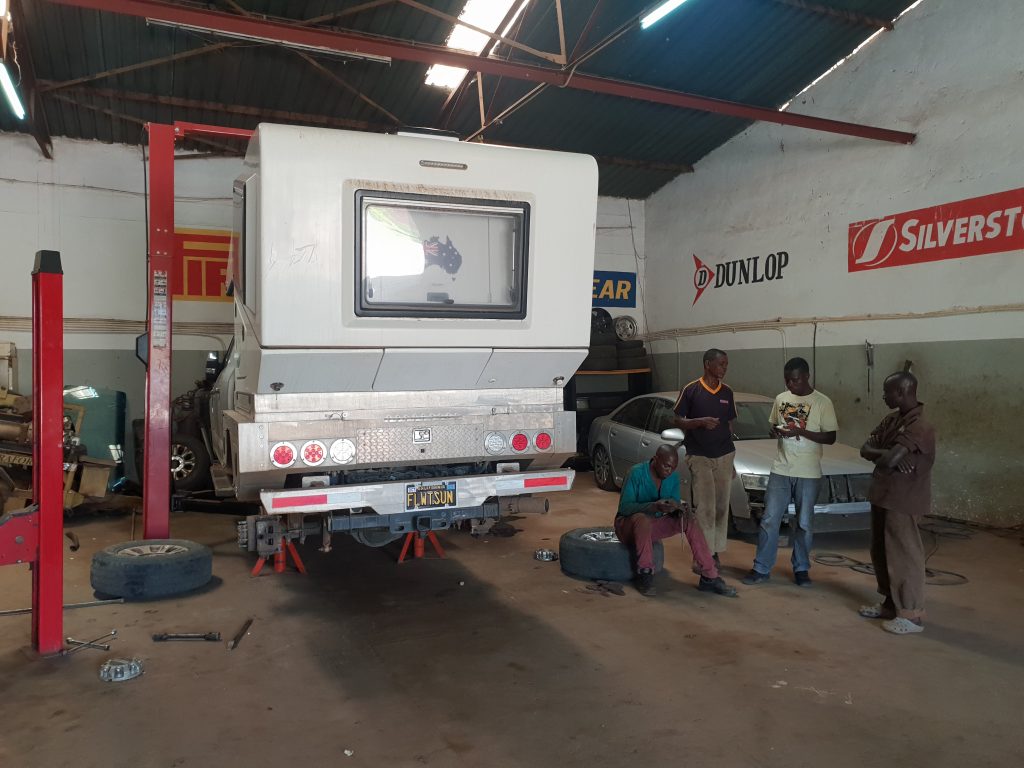
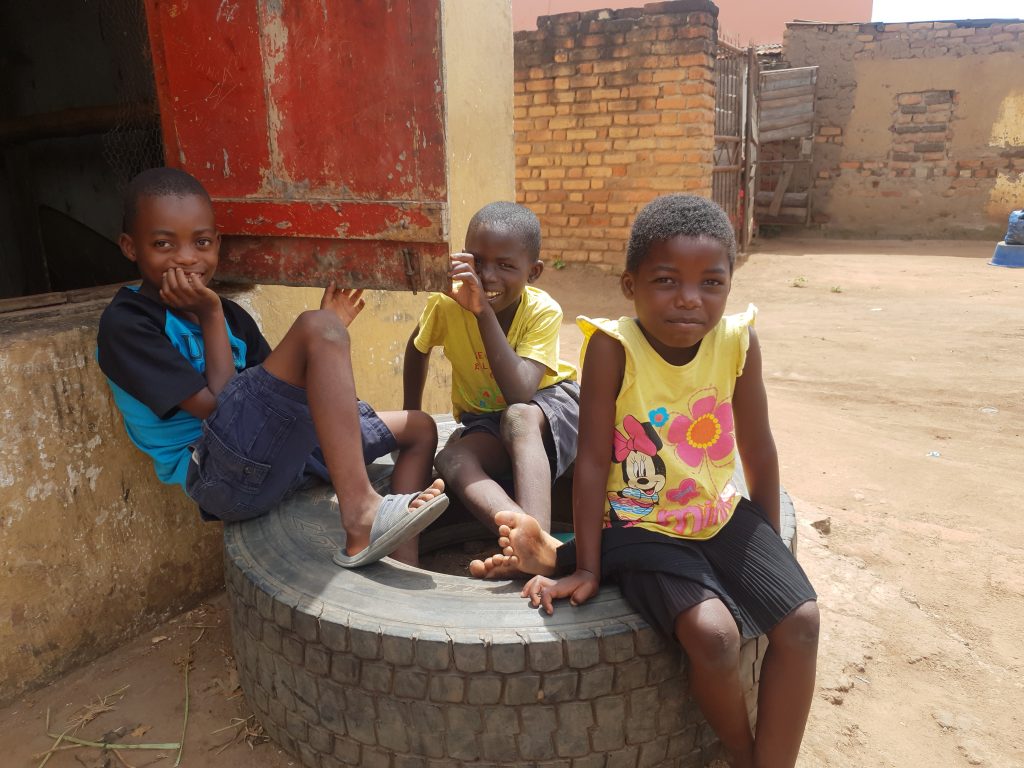



Looks so very exciting yet strangely scary. I was really worried about the 25,000 until I read further and realised that it was only about $50 but I hope you argued him down way lower than that. Julie you will have an amazing wardrobe of sarongs from every corner of the world with fantastic memories attached to each of them. Stay safe and come home smiling xoxo
Hi Anne, all the different currencies can do your head in if you’re not careful but when in doubt you can always revert to US dollars! If I’m not giving it to policemen then Julie is spending it in roadside stalls.
A great read as always Bill. Sorry to hear you’ve been having tyre and brake problems. If you’d like me to get some F250 pads sent out to you let me know.
Hi Gavin, we’re going to have some major maintenance issues when we get back to the UK – pads, tyres, shocks, some welding and the hydraulics, amongst others. African roads are brutal!